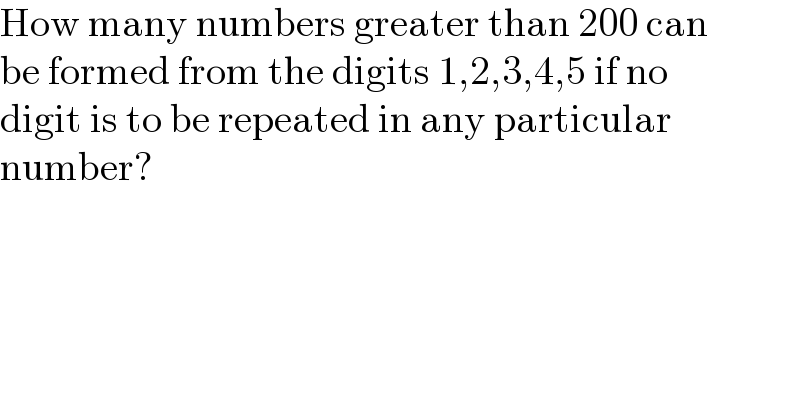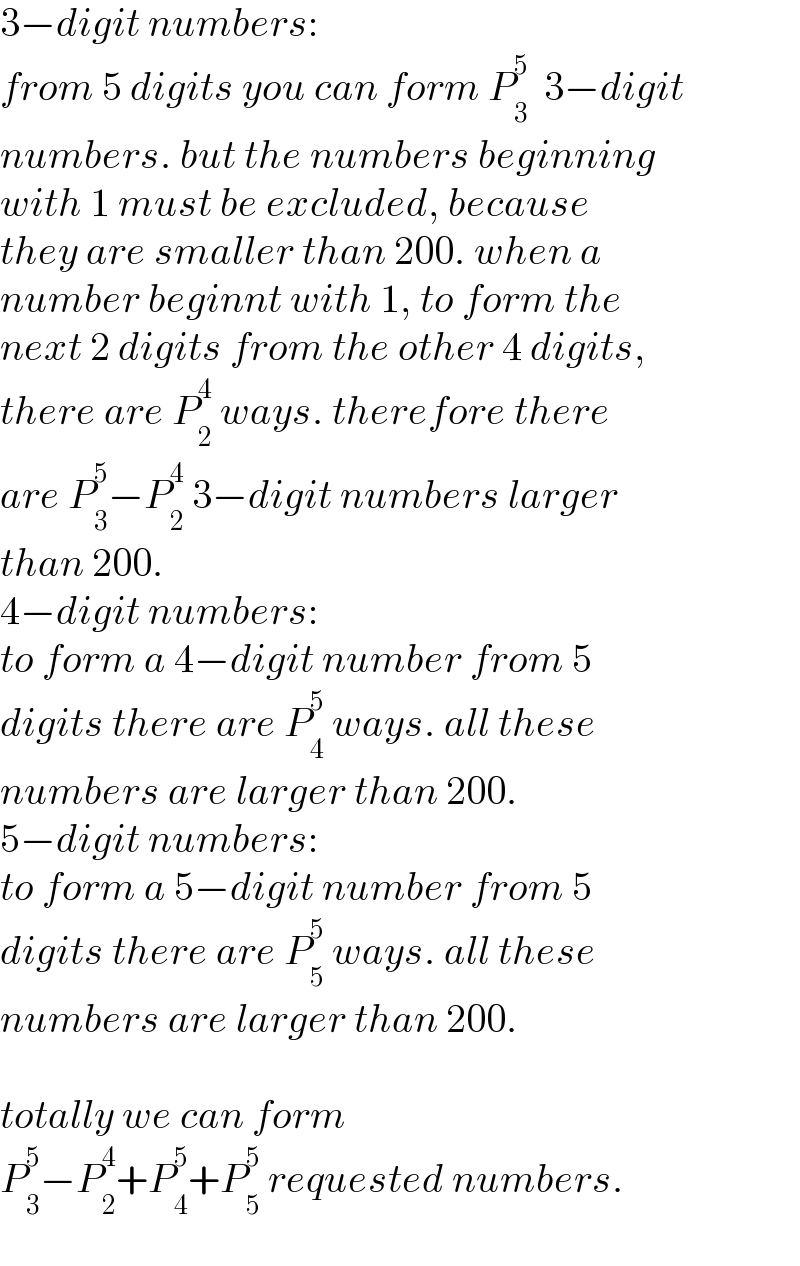
Previous in Permutation and Combination Next in Permutation and Combination
Question Number 151615 by pete last updated on 22/Aug/21

$$\mathrm{How}\:\mathrm{many}\:\mathrm{numbers}\:\mathrm{greater}\:\mathrm{than}\:\mathrm{200}\:\mathrm{can} \\ $$$$\mathrm{be}\:\mathrm{formed}\:\mathrm{from}\:\mathrm{the}\:\mathrm{digits}\:\mathrm{1},\mathrm{2},\mathrm{3},\mathrm{4},\mathrm{5}\:\mathrm{if}\:\mathrm{no} \\ $$$$\mathrm{digit}\:\mathrm{is}\:\mathrm{to}\:\mathrm{be}\:\mathrm{repeated}\:\mathrm{in}\:\mathrm{any}\:\mathrm{particular} \\ $$$$\mathrm{number}? \\ $$$$ \\ $$
Answered by mr W last updated on 22/Aug/21

$${P}_{\mathrm{3}} ^{\mathrm{5}} −{P}_{\mathrm{2}} ^{\mathrm{4}} +{P}_{\mathrm{4}} ^{\mathrm{5}} +{P}_{\mathrm{5}} ^{\mathrm{5}} =\mathrm{288} \\ $$
Commented by pete last updated on 22/Aug/21

$$\mathrm{Thanks}\:\mathrm{sir},\:\mathrm{but}\:\mathrm{can}\:\mathrm{you}\:\mathrm{please}\:\mathrm{explain} \\ $$$$\mathrm{a}\:\mathrm{little}? \\ $$
Commented by mr W last updated on 22/Aug/21

$$\mathrm{3}−{digit}\:{numbers}: \\ $$$${from}\:\mathrm{5}\:{digits}\:{you}\:{can}\:{form}\:{P}_{\mathrm{3}} ^{\mathrm{5}} \:\:\mathrm{3}−{digit} \\ $$$${numbers}.\:{but}\:{the}\:{numbers}\:{beginning} \\ $$$${with}\:\mathrm{1}\:{must}\:{be}\:{excluded},\:{because} \\ $$$${they}\:{are}\:{smaller}\:{than}\:\mathrm{200}.\:{when}\:{a} \\ $$$${number}\:{beginnt}\:{with}\:\mathrm{1},\:{to}\:{form}\:{the} \\ $$$${next}\:\mathrm{2}\:{digits}\:{from}\:{the}\:{other}\:\mathrm{4}\:{digits}, \\ $$$${there}\:{are}\:{P}_{\mathrm{2}} ^{\mathrm{4}} \:{ways}.\:{therefore}\:{there} \\ $$$${are}\:{P}_{\mathrm{3}} ^{\mathrm{5}} −{P}_{\mathrm{2}} ^{\mathrm{4}} \:\mathrm{3}−{digit}\:{numbers}\:{larger} \\ $$$${than}\:\mathrm{200}. \\ $$$$\mathrm{4}−{digit}\:{numbers}: \\ $$$${to}\:{form}\:{a}\:\mathrm{4}−{digit}\:{number}\:{from}\:\mathrm{5} \\ $$$${digits}\:{there}\:{are}\:{P}_{\mathrm{4}} ^{\mathrm{5}} \:{ways}.\:{all}\:{these} \\ $$$${numbers}\:{are}\:{larger}\:{than}\:\mathrm{200}. \\ $$$$\mathrm{5}−{digit}\:{numbers}: \\ $$$${to}\:{form}\:{a}\:\mathrm{5}−{digit}\:{number}\:{from}\:\mathrm{5} \\ $$$${digits}\:{there}\:{are}\:{P}_{\mathrm{5}} ^{\mathrm{5}} \:{ways}.\:{all}\:{these} \\ $$$${numbers}\:{are}\:{larger}\:{than}\:\mathrm{200}. \\ $$$$ \\ $$$${totally}\:{we}\:{can}\:{form} \\ $$$${P}_{\mathrm{3}} ^{\mathrm{5}} −{P}_{\mathrm{2}} ^{\mathrm{4}} +{P}_{\mathrm{4}} ^{\mathrm{5}} +{P}_{\mathrm{5}} ^{\mathrm{5}} \:{requested}\:{numbers}. \\ $$
Commented by pete last updated on 26/Aug/21

$$\mathrm{Thank}\:\mathrm{you}\:\mathrm{sir} \\ $$
